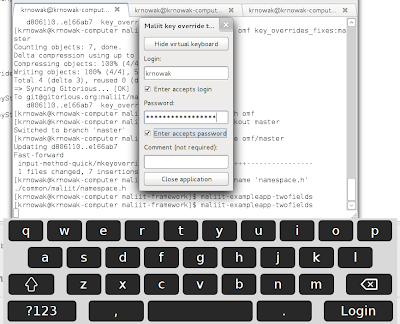Krzesimir Nowak joined Openismus in the beginning of August this year. Not only is he a very talented developer (or, as I once said, the first one to actually fill the gap Daniel left), but he's also fun to work with.
Just before I went on my vacations in September, I left him with some nice tasks to improve one of the cool features in Maliit: Dynamic key overrides. The way I had set up the tasks I knew he would trip over bits of hideous code and seeing how he could deal with it was part of the exercise.
For now, Krzesimir's work on Maliit is finished. With 25 commits, two of them being bug fixes in said ugly code, Krzesimir did an outstanding job while thoroughly understanding and fixing one of Maliit's core features in a rather short time span. Of course he will tell you that it took him way too long ;-)
Thanks for your contribution, Krzesimir, and well done!








